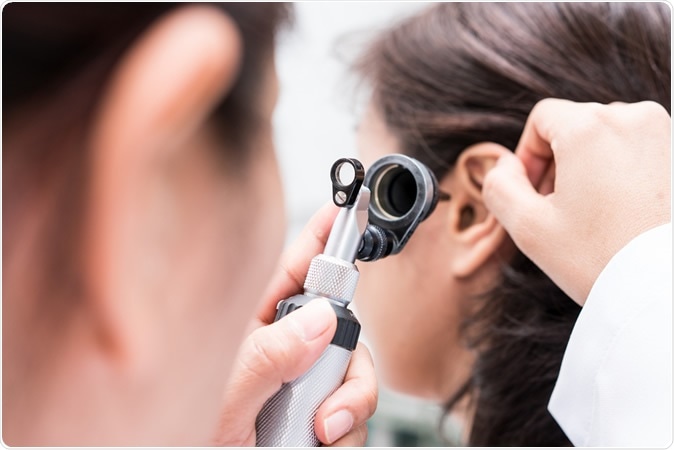Jun 12 2019
Researchers have found that anti-malarial drug artemisinin could help patients with genetic or hereditary hearing loss. The study results were published in the latest issue of the journal Proceedings of the National Academy of Sciences (PNAS). The study was titled, “Unconventional secretory pathway activation restores hair cell mechanotransduction in an USH3A model.”

Image Credit: Bangkoker / Shutterstock
The team from Case Western Reserve University School of Medicine used a zebrafish model to check if the drug could work in hearing loss. They explain that hearing is due to the ability of certain proteins to reach the outer membrane of sensory cells present in the inner ear. They noted that the drug artemisinin can help the inner ear to recognize and transport an important protein to the cell membranes of the specialized cells of the inner ear. These sensory cells contain hair-like projections on the surface and are called “hair cells”. The sound waves create vibrations which make the hairs on the cells move. This movement signal is then converted to electric signals that are transmitted to the brain which reads it as sound. These cells are important thus, not only for hearing but also for balance.
The team explains that there is a mutant form of the essential protein called the protein-clarin1. This mutant form, unlike the normal version can render the hair cells unable to transport the protein to their membranes. This stoppage of the transport stops the hearing mechanism. Most of the mutant clarin1 proteins thus get trapped within the hair cells. This renders the cells incapacitated and these cells soon die. In patients with Usher syndrome, there is presence of this faulty or mutant clarin1. This leads to genetic hearing loss.
The team used genetically engineered zebrafish to have human versions of the mutant protein. The anti-malarial drug artemisinin was then seen to restore the inner ear sensory cell function. This led to restoration of both hearing and balance.

The zebrafish is used by biologists because its body is transparent. Image Credit: Peter Verreussel / Shutterstock
Lead author of the study, Kumar N. Alagramam, PhD, The Anthony J. Maniglia Chair for Research and Education, and associate professor at Case Western Reserve University School of Medicine Department of Otolaryngology at University Hospitals Cleveland Medical Center, explained that he and his team have been working on this mutant protein for some time now. He said, “We knew mutant protein largely fails to reach the cell membrane, except patients with this mutation are born hearing. This suggested to us that, somehow, at least a fraction of the mutant protein must get to cell membranes in the inner ear.”
The team was looking for pathways that would secrete mutant clarin1 to take it to the membranes, he Alagramam explained adding, “If we can understand how the human clarin1 mutant protein is transported to the membrane, then we can exploit that mechanism therapeutically.”
The team then created genetically engineered zebrafish models that replaced their genes coding for zebrafish clarin1 with human versions. Some were given normal human clarin 1 and others mutant ones that cause Usher syndrome in humans. Alagramam said, “Using these 'humanized' fish models we were able to study the function of normal clarin1 and, more importantly, the functional consequences of its mutant counterpart. To our knowledge, this is the first time a human protein involved in hearing loss has been examined in this manner.”
Zebrafish modesl were chosen for this study because they are easy to study and when they are in their larvae stage, they are transparent. This helps in studying their inner ear structure. The genes in these zebrafish that regulate hearing are also similar to humans which made the switching easy. The team used fluorescent tags on the proteins to track its movement with in the hair cells of the Zebrafish. Alagramam said, “As far as we know, this is the first time a human mutant protein associated with hearing loss has been shown to be 'escorted' by the unconventional cellular secretion pathway. This mechanism may shed light on the process underlying hearing loss associated with other mutant membrane proteins.”
They noted that the mutant clarin1 was trapped within the tubules of the cells. If these could be freed, found the team, there may be a therapeutic benefit. To obtain this they tried two different drugs - thapsigargin (an anti-cancer drug) and artemisinin (an anti-malarial drug). Results revealed that when the drugs were used, the trapped proteins were indeed liberated and thus the levels of clarin1 rose in the membrane. Overall the hearing and balance functions also imporved in the treated zebrafish compared with the untreated ones.
The researchers found that balance was necessary for the zebrafish to swim. The zebrafish with mutant clarin1 were faltering in their balance until they were treated with artemisinin. The survival of the fish depends on their ability to swim. On treatment with artemisinin, the survival rates of the zebrafish rose from 5 to 45 percent explained the researchers.
Alagramam said, “Our report highlights the potential of artemisinin to mitigate both hearing and vision loss caused by clarin1 mutations. This could be a re-purposable drug, with a safe profile, to treat Usher syndrome patients.”
Sources:
- Unconventional secretory pathway activation restores hair cell mechanotransduction in an USH3A model, Suhasini R. Gopal, Yvonne T. Lee, Ruben Stepanyan, Brian M. McDermott, Kumar N. Alagramam, Proceedings of the National Academy of Sciences May 2019, 116 (22) 11000-11009; DOI: 10.1073/pnas.1817500116, https://www.pnas.org/content/116/22/11000